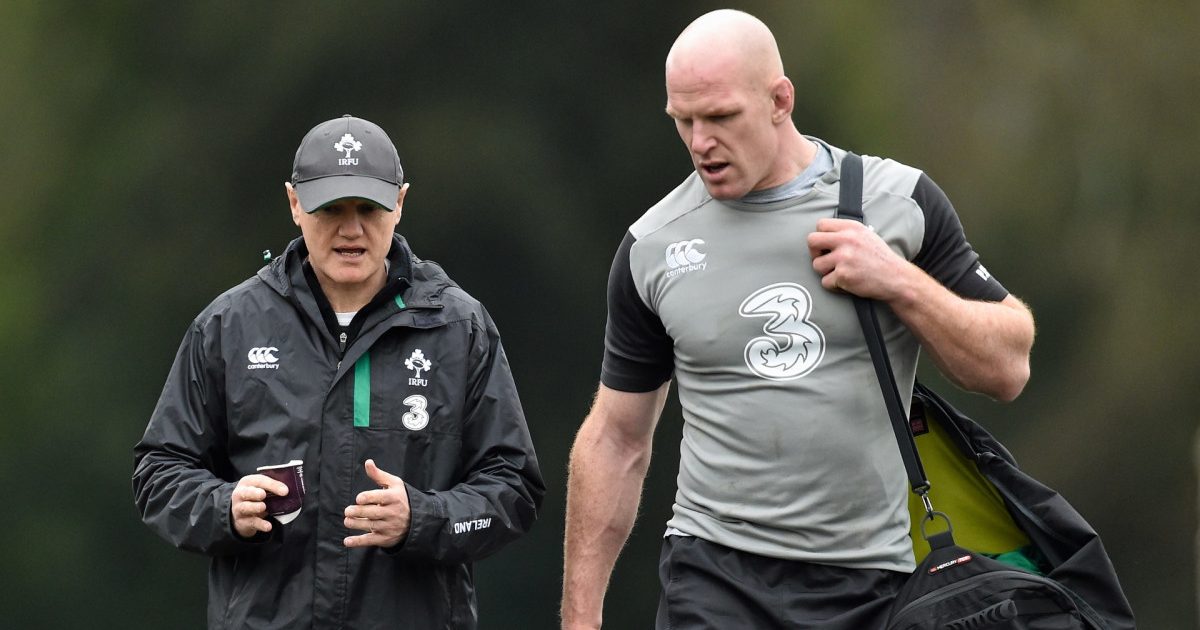The one major difference from the Joe Schmidt era Paul O'Connell has spotted under Andy Farrell

New Ireland assistant Paul O’Connell has outlined the one clear difference he has experienced so far during his short time working with the Andy Farrell regime compared to what he experienced as a player under Farrell’s predecessor Joe Schmidt.
Talismanic second row O’Connell captained Schmidt’s Ireland to successive Six Nations titles before retiring from playing after an injury at the 2015 World Cup. He has since coached at different levels of the game, mixing experiences from the Munster academy with Ireland U20s and Stade Francais.
Inactive since leaving the Stade set-up under Heyneke Meyer in June 2019, O’Connell was sounded out by Ireland boss Farrell after their third-place Autumn Nations Cup finish last December to see might he be interested in becoming involved at Test level.
It was a surprise offer as he didn’t sense there was an opportunity there. However, he agreed to become Ireland’s forwards coach and he has found one aspect of his experience so far contrastingly different to what he had previously known under the Schmidt regime six years ago.
Appearing at his first media conference since it was announced on January 7 he was joining the Farrell ticket, O’Connell was asked if he had been struck by any noticeable then and now contrasts so far in the preparations for next Sunday’s Guinness Six Nations opener away to Wales.
ANALYSIS: @heagneyl ??? looks back on Andy Farrell's first year in charge of Ireland #ICTYMI https://t.co/kLL7qJ2PZ8
— RugbyPass (@RugbyPass) January 3, 2021
“We are in the HPC now and that has made a big change to it because you have pitch-side televisions, you have TVs in the gym so you are able to have these mini-meetings, short meetings where you are able to go from a meeting to a little bit of technical work back to meeting to a little bit of technical work,” he said, highlighting how the team now trains at a rugby specific facility at Sports Campus Ireland rather at Carton House, their hotel base.
“There was going to be a natural change anyway from when Joe finished to when Andy took over. When we had meetings with Joe, he loved a meeting. He was box office when he delivered and he was always trying to keep everything under 30 minutes so there wasn’t a lot of questions.
“But I always enjoyed then debating things after the meeting with him and I never felt like I couldn’t question him or argue with him and I loved his environment. It’s probably similar here, just shorter meetings because there is more time for questioning.
“In fairness, the question that Tom O’Toole asks in a meeting today and the answer he gets is probably a question that seven or eight people should be asking as well so it’s probably good that we have those discussions and debates. And that’s the way players learn now. It’s isn’t about long meetings.
“It’s short, sharp meetings, they watch things on their phone. You can send them things on their phone. That wasn’t there towards the end of my time when I retired. We were into a meeting, into the group, we had a meeting, it was generally half an hour long and hen the questioning would happen afterwards over dinner or lunch or whatever that was. It’s different here.
“Look, the Crusaders have been very good at it from when you chat to Rog [Ronan O’Gara, the ex-Crusaders assistant now at La Rochelle], it’s collaborative, trying to get players to coach, trying to get them to own what they are doing. If someone can coach something, explain it really well to someone else, they know what they are doing and it’s a great way to check for their learning and their understanding.”
Reflecting on Farrell reaching out to him to come and join Ireland, O’Connell admitted the approach took him by surprise. “It did. I would speak to him [Farrell] a lot and I would speak to other coaches a lot. I just find watching the game interesting.
“I find even the rugby matches that people find boring these days where there is a lot of kicking, I always find it interesting trying to figure out why teams are doing what they are doing. There is generally a logical reason behind it so I’d always be picking up the phone to coaches. But we hadn’t ever discussed that so it was a surprise.”
"My fear is that if it goes too far from what is a touring side with 30,000 fans to games at home with no fans, will it keep its special place in rugby’s hearts?"
– A solution from Keith Wood to the current impasse, w/@chrisjonespress ???#LionsRugbyhttps://t.co/Su3rZl9I79
— RugbyPass (@RugbyPass) February 2, 2021





























